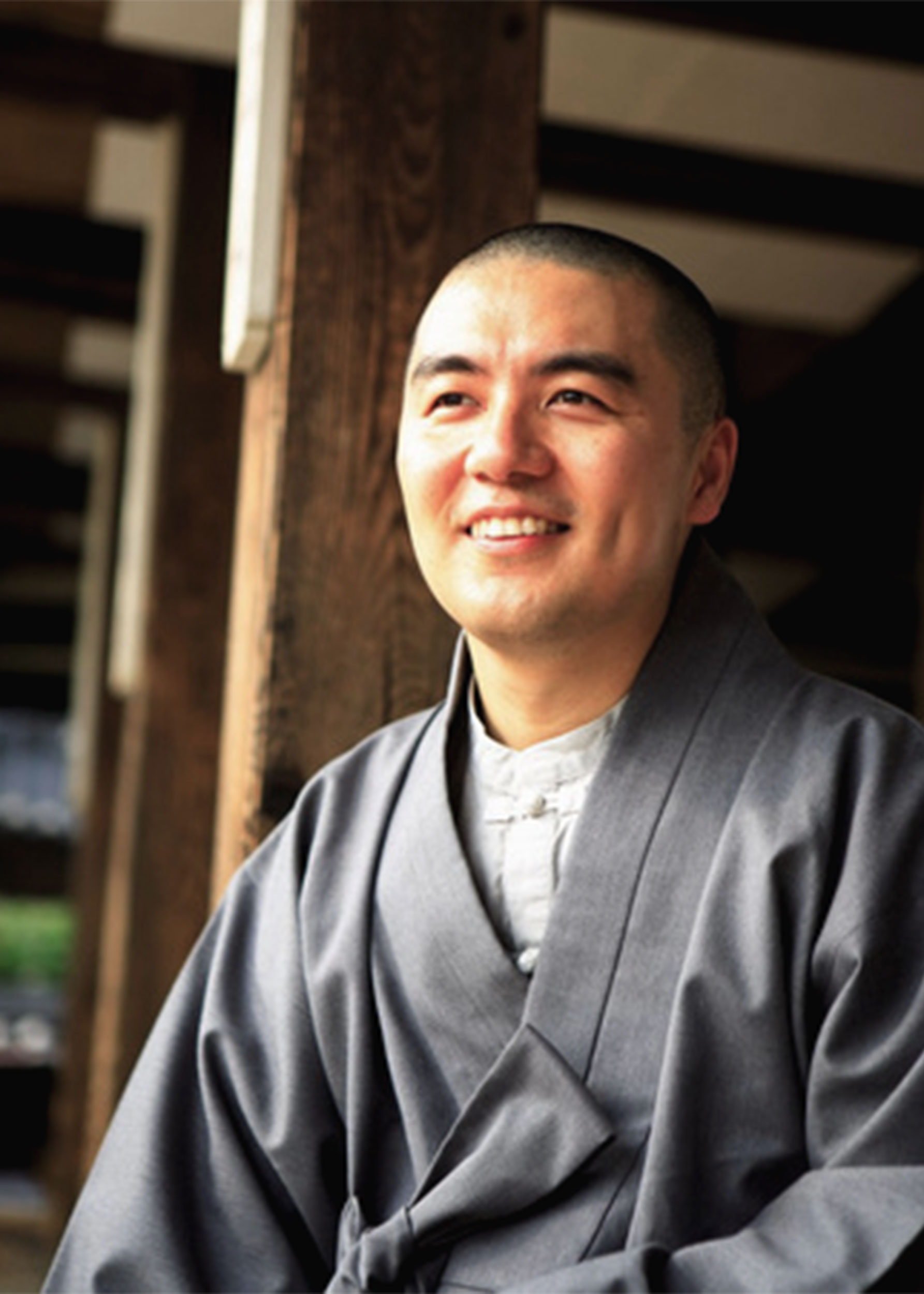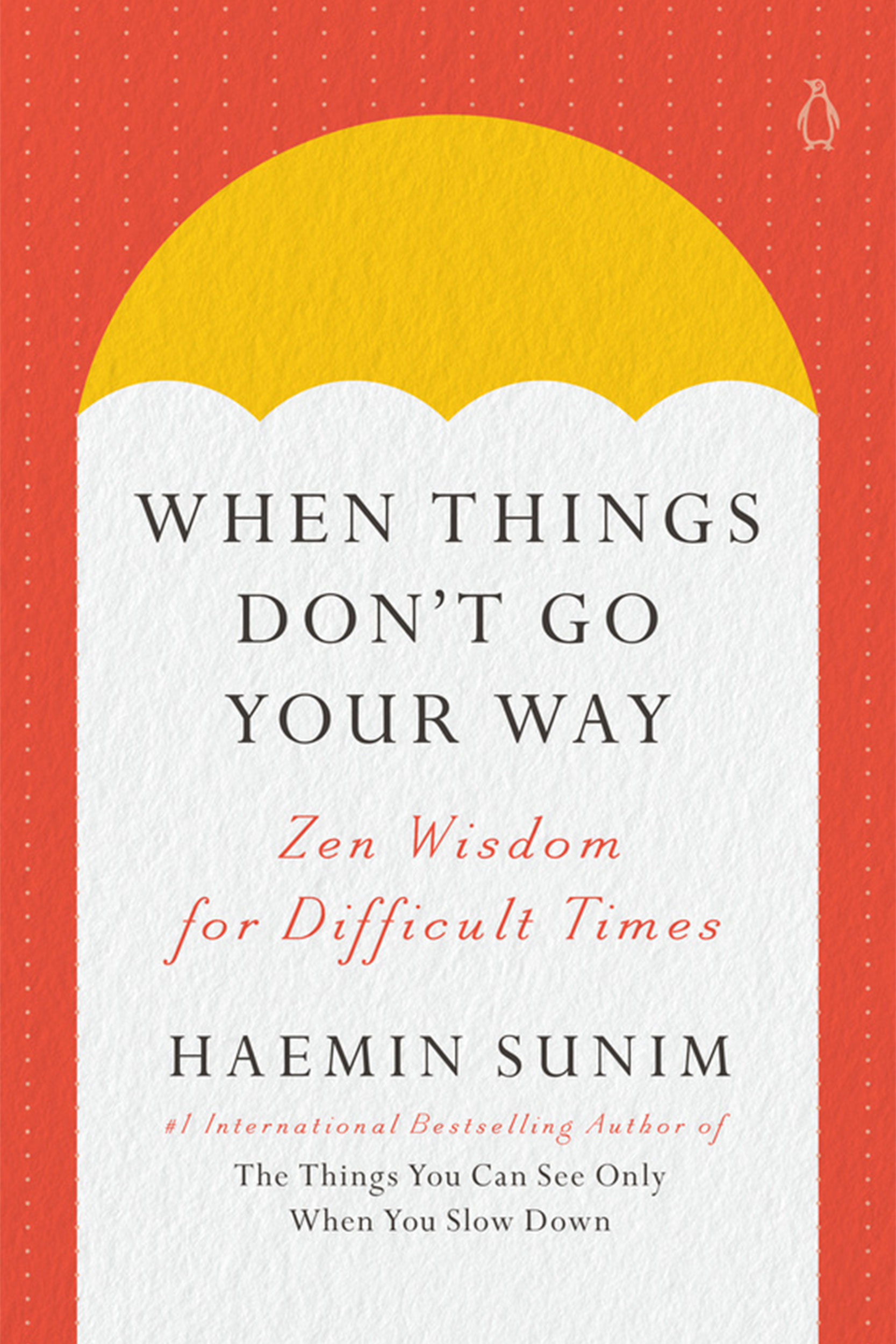
Haemin Sunim, M.T.S. ’99.
Photo by Myeonghak Jhang ©
Why are we unhappy?
Zen Buddhist teacher says it’s because we’re always struggling either to possess or avoid people, things, or situations
Excerpted from “When Things Don’t Go Your Way: Zen Wisdom for Difficult Times” by Haemin Sunim, M.T.S. ’99, published by Penguin Life, an imprint of Penguin Publishing Group, a division of Penguin Random House, LLC.
We are unhappy because we can’t find peace with what is. We wish things different from what is happening at that moment. For instance, if we see something attractive or pleasant, our mind cannot remain calm. Rather, it is drawn toward the new object, wants to stay close to it, and wishes to engage with it. If possible, we want to possess it completely and use it as we desire. The Buddha described this kind of mental pursuit as “grasping.” When our mind is grasping at something, we feel unfulfilled until we have the object under our control. While sensing incompleteness, the mind is restless and dissatisfied.
Conversely, if we perceive something to be disagreeable or unpleasant, our mind wants to run away and avoid contact with it for as long as we can. If we must encounter it, we try to do so as briefly as possible. Unlike the grasping mind, the mind in this state is “resisting.” The longer we resist, the more intolerable the situation becomes. We grow increasingly anxious and even angry since we can’t walk away from it. Modern psychologists call this mental resistance “stress.” When stressed, we are almost always resisting something — be it a person, object, or situation.
This is not to suggest that you should not resist things that make you miserable. Rather, I am simply pointing out the fact that it may not be the person, object, or situation in and of itself that is causing you to feel unhappy and stressed. If the unpleasant quality were intrinsic to the person, for instance, then that person would be deemed unpleasant by everyone, not just you personally. However, the degree to which someone is unpleasant varies widely among individuals; I might find him aggravating, while my friend thinks he is charming.
Then what is the true cause of our frequent unhappiness? The real culprit, in my opinion, is constant mental activity toward objects. As long as a mind swings back and forth — grasping for something you don’t have and resisting something you already have — it will remain in a perpetual state of struggle and busyness. It will find a current situation subtly, or not so subtly, unsatisfying and problematic. Such a mind is often tensed, and lacking relaxed openness, acceptance, and self-awareness. If it doesn’t turn inward and become aware of its habitual tendency to move away from a given situation, a mind will continue to jump from one object to the next — always blaming external things for its inner discomfort. Such a mind also demands that a person, object, or situation change to accommodate its preference since, according to this mind, the desired change is not just a better and sensible alternative but also the right course of action.

It is important to note here that I am not trying to condone people’s bad behavior, as if we are to blame ourselves for feeling unhappy. My point is that the mind is an intermediary agent, interpreting how we feel about what is happening in the world around us. A raw experience is neither inherently good nor bad. It just is. Yet our minds are quick to judge and then interpret something as either pleasant or unpleasant. Not surprisingly, the same raw experience can be interpreted quite differently from person to person, as each individual has been uniquely conditioned depending upon their past experiences.
If this is indeed the case, what can we do to make our minds feel at peace and content, instead of ceaselessly grasping and resisting? Are there any practices with which we can better regulate our emotions and find equanimity and acceptance?
The most well- known practice for countering the mind’s tendency to wander is gratitude. When we feel thankful, we usually don’t think about what we don’t have, or what we could have. This diminishes the mind’s grasping tendency to want something else. At the same time, a grateful mind is open and receptive, so the resisting tendency of disliking what is here is also diminished. As we become glad about what has happened in the past and grateful for what we already have right now, our mind becomes calm and peaceful, unlike a resisting mind that is often full of critical thoughts, complaints, or arguments. When our heart is filled with thankfulness, there is little to no room for such negative thoughts.
When we practice gratitude, we can acknowledge not only what we are fortunate enough to have, including health, a job, a home, clothes, nice weather, and so on, but also what others have provided for us to maintain our good lives. For instance, we can be grateful for a parent’s continuous support, a friend’s wicked humor, or a partner’s warm hug. We can also say “thank you” to ourselves for not giving up in the face of multiple rejections, for picking ourselves up after heartbreak. The more we practice gratitude, the more we will come to appreciate and be thankful for the things we have.
To practice gratitude, look for three to five things a day to be thankful for and send a text message to yourself or a “gratitude buddy,” someone willing to exchange grateful experiences.
Another idea is to pick up a beautiful pebble and place it somewhere visible in your home. Every time you pass and look at the pebble, search your mind for one thing to be grateful for at that moment. You could also take a photo every time you feel thankful, and share it with friends and family. Or you could make a habit out of saying a heartfelt “thank you” quietly or out loud to those who assist you at a restaurant, supermarket, coffee shop, or gas station, or on a bus or train.
Another way to counteract the mind’s restless tendency is to wholeheartedly welcome unhappy experiences. Since our emotional well-being is primarily determined not so much by the present situation but rather our response to it, we can reduce our suffering by intentionally switching from the impulse to resist to a welcoming attitude. Rather than thinking that those uncomfortable situations shouldn’t be here, as if they were anomalies, we should include them as a part of our everyday default settings. Instead of praying that difficult situations never arise, we should not only expect to experience them but also welcome them. That way, when they occur, we won’t feel surprised or even upset because we know that they are and always will be part and parcel of our lives.
As for actual practices, while brushing your teeth or washing your face in the morning, spend one minute telling your mind a few times, “Bring on discomfort! I will accept you gladly.” Having primed your mind to anticipate an uncomfortable situation early on, and having made your intention to accept it clear, you will be ready when you actually run into it. Of course, if the situation is life-threateningly uncomfortable, remove yourself from it as swiftly as possible. But if the situation is not life-threatening, just unavoidable, you can become mindful of your inclination to resist it and adopt a welcoming attitude by repeating this affirmation, “Bring on discomfort! I will accept you gladly.” Then, when that uncomfortable situation arises, count backward — “three, two, one” — and march right into it without any hesitation.
We can also have a more accepting relationship with unhappiness by reminding ourselves that the universe wants us to grow from the pain of unhappy experiences. When every situation is agreeable and pleasant, we have no reason to grow into a more mature version of ourselves. Only when we move out of our comfort zone and find ourselves in the space of unfamiliarity and discomfort do we begin to learn and expand intellectually, emotionally, and spiritually. According to the 13th-century Persian poet Rumi, “The wound is the place where the light enters you.” Instead of turning away from our wounds, we should examine them closely and discover the hidden light of gratitude, acceptance, and wisdom.
Copyright © 2018, 2024 by Haemin Sunim. English translation copyright © 2024 by Charles La Shure.




